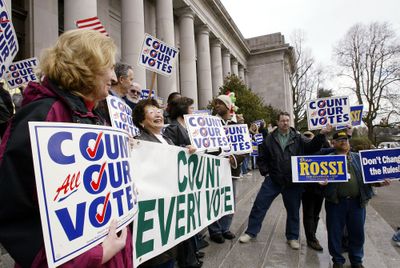Mail-in voting makes for slow election results
Close races usually take days to settle

OLYMPIA – In Washington state, the election won’t be over on Election Night.
The state’s vote-by-mail system ensures that any close race will be unsettled for days afterward. That’s because ballots count if they’re mailed as late as midnight on Election Day, a system that usually leaves about half of the vote outstanding at the end of the night, keeping politicians and the public in a state of limbo.
“It’s one of the negative consequences of the extent we vote by mail,” said Lance LeLoup, a political scientist at Washington State University.
Washington state is one of more than two dozen states that allow voters to cast absentee ballots without an excuse like illness, disability or travel. Numerous other states, like Florida, allow early voting at poll sites, along with absentee ballots. Most no-excuse absentee states, including Oregon, which is 100 percent vote-by-mail, require ballots to be in by the time the polls close on Election Day, if not earlier.
Washington is one of just a handful of states that require a postmark by Election Day or the day before, allowing ballots to arrive days later. But of those states, only Washington has a vast majority of mail voters who create a crush of ballots for county auditors to count after Election Night.
Hotly contested races, like the rematch between Gov. Chris Gregoire and her Republican opponent, Dino Rossi, could be long, drawn-out affairs.
“People want this done and counted and over with,” said Sen. Pam Roach, an Auburn Republican who in past years has introduced bills that would have required an Election Day deadline for everyone except military and voters who are traveling. “This protracted process only adds to the suspicion of some and the dismay of others.”
But those who support the state’s current system say an earlier deadline won’t necessarily help.
“Even if you do require all mail ballots to be returned by 8 p.m. Election Day, you will not get the certified election results Election Night,” said Clark County Auditor Greg Kimsey. “There’s no way to count all those votes in one night.”
Voters in Washington state have been allowed to vote by mail since 1993. In 2004, more than 68 percent of the state’s voters voted by mail. Now all but two counties – Pierce and King – have done away with polling sites; 95 percent of the state’s voters voted absentee in August’s primary.
Add in a surge in new voter registrations and high projected turnout, and some worry about a repeat of the extended 2004 election between Gregoire and Rossi.
Four years ago, Rossi took an early lead and 15 days after Election Day, it appeared he had beaten Gregoire by 261 votes. A machine recount narrowed the lead to just 42 votes.
A second recount, done by hand and paid for by state Democrats, put Gregoire ahead by 129 votes out of 2.8 million cast. Rossi sued, but Gregoire was inaugurated and the court challenge ultimately failed, although the judge threw out four illegally cast votes for Rossi, raising Gregoire’s margin of victory to 133.
Polls show Gregoire and Rossi running very close again, all but ensuring that the race will be unresolved on Election Night.
Smaller counties, including those in conservative rural areas, will likely get their votes counted faster, which could lead to a repeat of 2004, when Rossi was ahead on Election Night, but watched his lead dwindle as the vote was counted in greater Seattle.
King County holds about one-third of the state’s voters, including heavily Democratic Seattle. King County’s election director, Sherril Huff, expects her operation to count 100,000 ballots a day.
The count will be slowed by the fact that King County still has polling sites and has installed safeguards to guard against some of the mistakes that plagued the 2004 count.
“What’s most important is that when we provide the result, we provide a result that’s accurate and one that everyone can have confidence in.”
Elections Director Nick Handy and his boss, Secretary of State Sam Reed, argue that improving the public’s perception of elections is one of the best reasons to follow Oregon’s lead and require ballots be in by Election Day.
“We believe it builds greater trust and confidence in the system,” he said.
But they haven’t found much support in the Legislature.
Various bills, including Roach’s, have been introduced in past years, most recently in 2005, but all have died.
Rep. Sam Hunt, an Olympia Democrat and chairman of the House State Government and Tribal Affairs Committee, which handles elections issues, said he doesn’t support the earlier deadline because voters should be allowed to consider their options right up until Election Day.
“We’re giving them the maximum time to make up their mind and get their vote in,” Hunt said.
Others are worried about disenfranchising people who get their ballots in late, or whose ballots are delayed in the mail. Handy acknowledges the concern but notes that every county already has drop boxes for ballots on Election Day, as Oregon does.
LeLoup says the concerns about changing the system are valid.
“If there were no consequences to fixing this problem, it’d be fixed already,” he said. “What we’re doing in this state is trading off maximizing turnout and participation. But the consequence is we don’t have results in a timely fashion.”